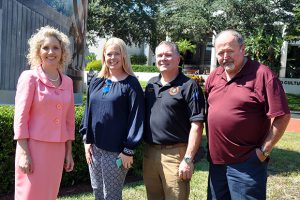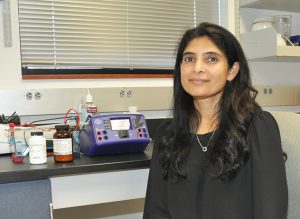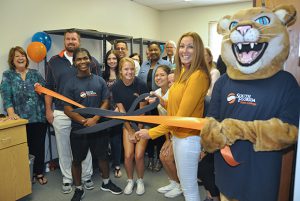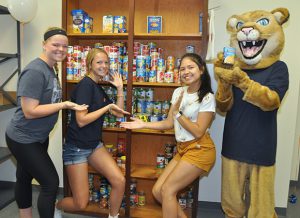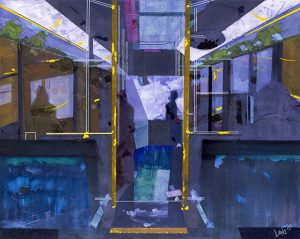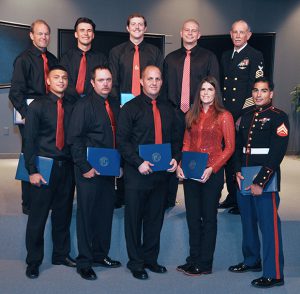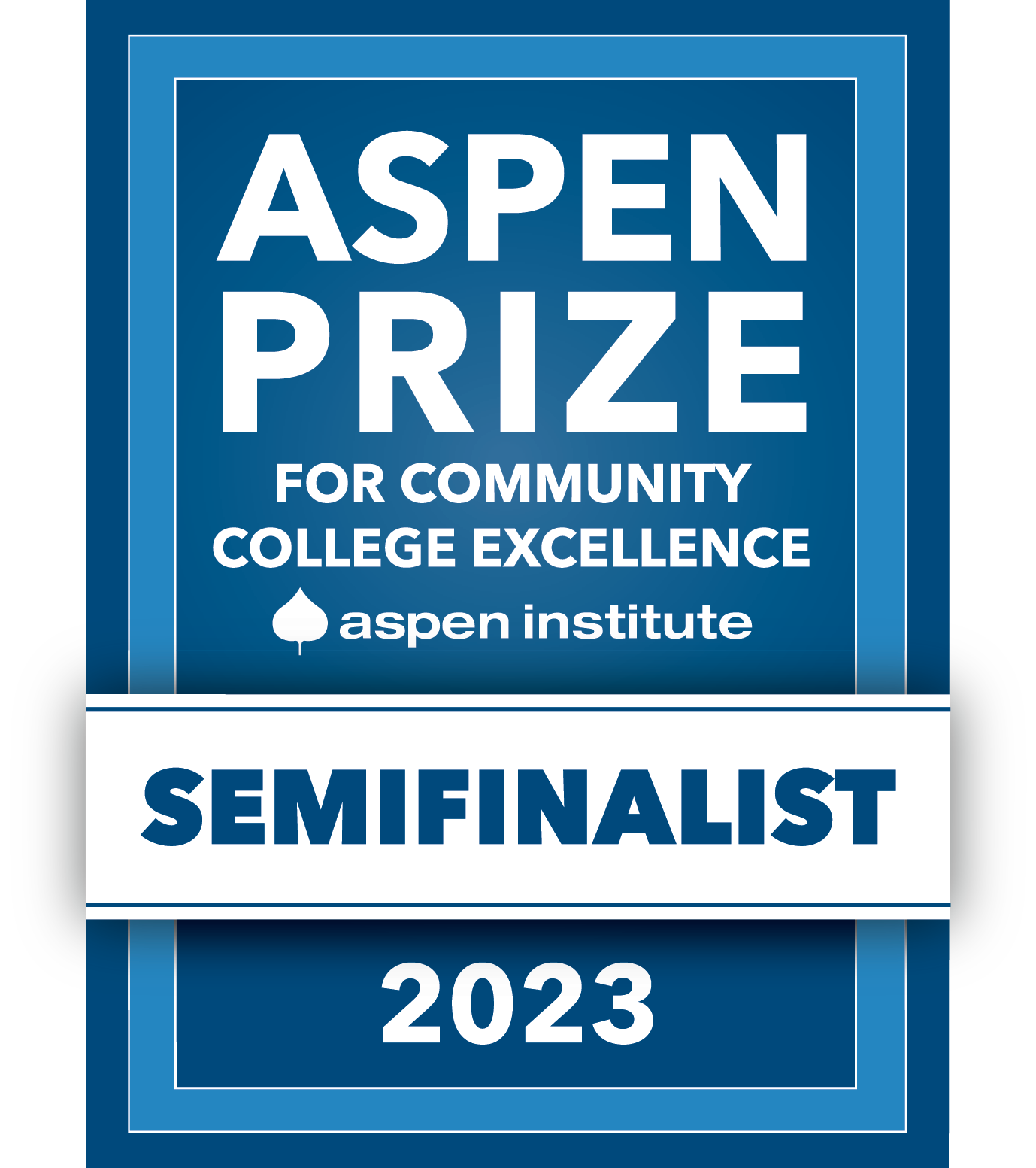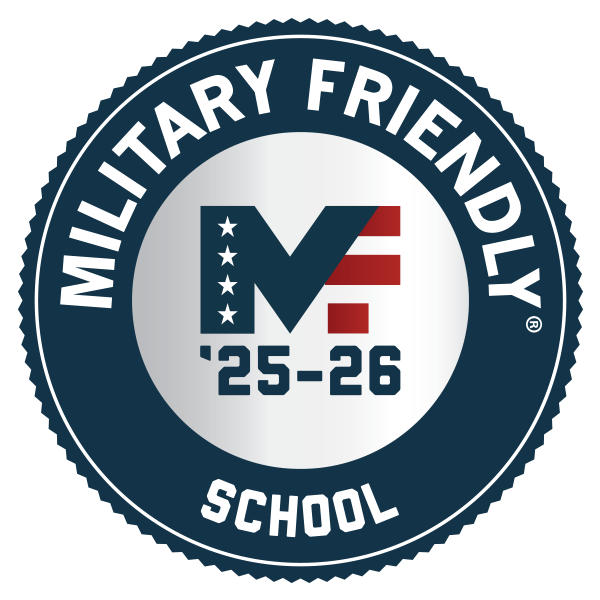AVON PARK, Fla. – Sept. 26, 2019 – The South Florida State College (SFSC) Foundation recently awarded four Innovation Grants to College employees. The recipients are Amy Bohan, Dr. Mintoo Patel, Bobby Sconyers, and Richard Shepard.
The SFSC Foundation offers these grants to support self-contained projects that make an innovative contribution to the College by improving the quality of the teaching and learning process. All SFSC employees are eligible to apply for an Innovation Grant. The maximum level of funding per project through this grant program is $1,500.
“We are grateful to our faculty and staff for recognizing the needs of our students and exploring creative ways to enhance the student experience at SFSC,” said Jamie Bateman, executive director of institutional advancement. “The SFSC Foundation is eager to get behind faculty and staff and support them in these growth initiatives.”
Amy Bohan will use the award to look at the microRNA levels in circulating canine plasma and determine their role as biomarkers for congestive heart failure. Students will learn how to isolate microRNA from canine plasma and then perform a series of lab tests to examine the gene express levels between dogs in heart failure and dogs that are not. The monies will allow students to expand their knowledge outside the classroom. They will learn how to read and understand scientific articles from well-established research journals. Students will learn how to collect scientific data by performing a variety of lab techniques and tests. They will then be able to represent SFSC at scientific conferences, presenting a talk or poster of their work done in the SFSC labs under Bohan’s guidance.
Dr. Mintoo Patel, adjunct instructor of biology, will use her award to acquire reagents and labware to conduct a research project for students enrolling in the courses under “Selected Topics in Biology and Biology Honors.” The research project enhances student learning by teaching scientific methodology and presentation, and students gain a deeper understanding of biology through STEM activities.
Bobby Sconyers, professor of dental assisting, would like to upgrade the Dental Education Department’s oral cameras by purchasing a second Eye Special C-III digital Dental camera for $2,795. The grant money will be included with other money from the Department toward the purchase. By training the students with a state-of-the-art camera, students will be prepared when they go into the workforce.
Richard Shepard, EMS professor, plans to better prepare students for the National Registry Paramedic Examination, which is required for Florida Paramedic Certification. He requested the purchase of a two-day test preparatory course for current paramedic students. The course would be hosted at SFSC and has a success level of greater than a 95% pass rate for first-time test takers. He requested 10 enrollments at $125 each. The preparatory class will better prepare students to take and pass the exam on the first attempt, allowing them to enter the workforce more quickly and give them the opportunity to become successful in their agency.
For further information about the SFSC Foundation Innovation Grants, contact Bateman at 863-784-7181 or Jamie.bateman@southflorida.edu.
AVON PARK, Fla. – Sept. 26, 2019 – South Florida State College (SFSC) recently held a ribbon-cutting ceremony and grand opening of its new Pete’s Panther Pantry on the College’s Highlands Campus in Avon Park. In attendance were students, College administrators, and employees. Tami Cullens, chair of the SFSC District Board of Trustees, cut the ribbon to officially open the Pantry.
Pete’s Panther Pantry, a partnership between SFSC and the SFSC Foundation, was established to assist students and employees in need of food and personal items. The Pantry offers a variety of non-perishable food items as well as pet food, feminine hygiene items, baby wipes, diapers, soap, and more.
The Pantry was developed in response to the epidemic of “food insecurity”—the lack of access to adequate amounts of healthy food— among college students.
“I have had students cry that they missed class or an assignment because they work two jobs to put food on the table for their families,” said Cindy Kinser, professor in the Medical Administrative Specialist program at SFSC and one of the organizers of Pete’s Panther Pantry. “Yet, they came to college to get off food stamps and make a better life for their children. When we have a homeless student who lives in their car and has little to eat, we need to help. To see the relief on the face of a student who has received food and can get more as needed, words simply cannot describe the satisfaction of being able to help them.”
According to the 2019 edition of the Varying Degrees study by New America, the report found that 46 percent of current college students indicated that “often, or at least sometimes, in the last 12 months, the food they bought just did not last and they did not have the money to buy more.” Students have to make difficult choices between buying food, paying for school fees, or buying diapers for their children.
In a December 2017 report by Katharine M. Broton and Sara Goldrick-Rab through the University of Iowa and Temple University, the authors wrote, “Efforts to increase college completion rates must be broadened to include attention to material hardship and shed light on this all-too-often hidden cost of college attendance.”
College and universities across the country have or are establishing food pantries for students. SFSC and the SFSC Foundation began its appeal to employees for non-perishable food and toiletries in December 2018 before launching Pete’s Panther Pantry.
Students and employees at SFSC can pick up food and personal items in Pete’s Panther Pantry, located in the Panther Activity Center (PAC) in Building D, on the second floor above the Panther Gym, in Room 233. Hours are Monday and Thursday, 11 a.m. – 1 p.m. If students or employees cannot get to the Pantry during these hours, they may contact Andy Polk, student life coordinator, at 863-784-7435 or Kinser at 863-784-7325. Students at the Hardee or DeSoto campuses or Lake Placid Center may also request items from Pete’s Panther Pantry by contacting Polk or Kinser. “We’ll send food over,” Kinser said.
Members of SFSC’s Student Government Association are on hand to watch expiration dates on products in the Pantry to make sure all food is fresh.
To donate food or other essential personal items to Pete’s Panther Pantry, drop items off at the PAC, Monday through Thursday, between 9 a.m. and 4 p.m. or in Building I, second floor, Room 202, Monday through Friday, between 8:30 a.m. and 3 p.m. To offer financial assistance, checks can be made out to: South Florida State College. Please put “Panther Pantry” in the memo on the check and send to the Cashier’s Office, South Florida State College, 600 West College Drive, Avon Park, FL 33825.
AVON PARK, Fla. – Sept. 23, 2019 – The South Florida State College (SFSC) Museum of Florida Art and Culture (MOFAC) will present The Stories Within: Alvaro Labanino & Miguel Saludes. This exhibition runs Wednesday, Oct. 2 – Wednesday, Nov. 20 at MOFAC’s gallery located in the east wing of the Alan Jay Wildstein Center for the Performing Arts on the SFSC Highlands Campus in Avon Park. Patrons of the museum may meet the artists during the exhibition’s opening reception on Thursday, Oct. 17, at 1 p.m. in MOFAC.
Labanino and Saludes, two Miami artists who met as teenagers in an art class in high school, have been endeavoring to help cement the city’s mark in the contemporary art scene in conjunction with their own. Together, over the years, they have built a rapport of artistic collaboration and a shared vision. Inspired by artist partnerships of the past, American-born Labanino and Cuban émigré Saludes fervently pursue an artistic legacy of the like within Miami and abroad.
The title of this exhibition, The Stories Within, alludes to the inward nature behind the presented works, each one delicately tailored from memories of people, places, and life circumstances that have affected and defined both Alvaro Labanino and Miguel Saludes. Every piece of artwork is a one-of-a-kind, unrepeatable chance to reason the sometimes unreasonable mysteries of life and to capture the often imperceptible fleeting trace of beauty that exists all around us.
Labanino’s work blurs the boundaries between the genres of still life, landscape painting, color field abstraction, and abstract expressionism. Within this traditional quadrilateral, Labanino depicts windows into his private living quarters. His interior spaces remind us of the living quarters once scrutinized by Vermeer or of those humanized by Van Gogh, and even of those haunting, hallucinated spaces by Bacon. Labanino sets out to make sense of the objects that surround him: an espresso percolator, a handful of paint tubes heaped inside of an easel cabinet, a bookshelf, a bed, to name but a few. Observed with detachment, these things have no meaning or inherent beauty, no significance, nor life of their own. However, to him, these objects and spaces are externalized parts of his soul.
To get inside of Saludes’ pictorial mind, we must place ourselves in a quiet space, away from the stress that permeates our lives. As the walls around us dissolve, we set ourselves free in the natural world where we’re overcome by a sense of immediate presence and of inner peace. Saludes invites us to slow down for a moment and contemplate reality anew.
MOFAC is located in the Wildstein Center at SFSC, 600 W. College Dr., Avon Park. The museum is open to the public on Wednesday, Thursday, and Friday, 12:30 – 4:30 p.m., or by appointment for group tours. Patrons of the Wildstein Center may visit the museum one hour prior to matinee and evening performances. For more information about MOFAC and its programs or to request a museum tour, contact Megan Stepe, curator, by phone at 863-784-7240, email at stepem@southflorida.edu, or visit mofac.org.
 Avon Park, Fla. – Sept. 20, 2019 – What do the Harry Potter books, “Captain Underpants” and “Thirteen Reasons Why” have in common? At some point, each one has been challenged or banned in libraries or schools. Banned Books Week, an annual celebration sponsored by the American Library Association, helps raise awareness of efforts to ban books and highlights our freedom to read. This year’s theme is “Censorship Leaves Us in the Dark. Keep the Light On!”
Avon Park, Fla. – Sept. 20, 2019 – What do the Harry Potter books, “Captain Underpants” and “Thirteen Reasons Why” have in common? At some point, each one has been challenged or banned in libraries or schools. Banned Books Week, an annual celebration sponsored by the American Library Association, helps raise awareness of efforts to ban books and highlights our freedom to read. This year’s theme is “Censorship Leaves Us in the Dark. Keep the Light On!”
The South Florida State College (SFSC) Library hosts a weeklong celebration Sept. 23–27 featuring displays, activities, and Banned Book Mystery Dating. Banned Book Mystery Dating allows anyone to check out an unknown book in a plain brown wrapper for a surprising read. Through a partnership with the Heartland Library Cooperative, public library card holders in good standing may check out SFSC Library books year-round.
Since its inception in 1982, Banned Books Week reminds us that while not every book is intended for every reader, each of us has the right to decide for ourselves what to read, listen to, or view. The SFSC Library and thousands of colleges, schools, libraries, and bookstores across the country will celebrate the freedom to read by participating in special events and exhibits that showcase books that have been banned, threatened, or burned.
Since 1990, the American Library Association’s (ALA) Office for Intellectual Freedom (OIF) has recorded more than 10,000 book challenges, including 347 in 2018. This year’s 11 most challenged books include titles challenged for LGBTQIA+ themes, profanity, mentions of sexual activities, and accusations of being “anti-cop.” The most challenged or restricted reading materials have been books for children. Even if the motivation to ban or challenge a book is well intentioned, censorship denies the freedom to individuals to choose and think for themselves.
The list also notes that several of the titles were burned in an effort to stifle the American public’s right to read freely. Thanks to the commitment of librarians, teachers, parents, and students, most challenges are unsuccessful, and reading materials like “I Know Why the Caged Bird Sings,” “Slaughterhouse Five,” the Harry Potter series, and the Hunger Games series remain available.
The SFSC Library is located on the Highlands Campus, 600 W. College Dr., in Building Y and is open Monday through Thursday from 7:30 a.m. to 9 p.m. and on Friday from 7:30 a.m. to 5 p.m. For more information, visit southflorida.edu/library or contact Claire Miller, SFSC librarian, at MillerC@southflorida.edu or 863-784-7305.
 AVON PARK, Fla. – Sept. 19, 2019 – The South Florida State College (SFSC) Criminal Justice Academy (CJA) is offering Live-Range Training for Concealed Weapons Holders. This course provides training to anyone who already has a valid concealed weapons permit. Instruction will include basic weapons handling, marksmanship, live-fire exercises, and care and cleaning of a handgun. Authorized weapons include revolvers or semi-automatic handguns in calibers .22, .25, 32, 380, 9 mm, 38, 357, 40, 45, and 44. Handguns chambered in rifle calibers or fully automatic weapons will not be allowed.
AVON PARK, Fla. – Sept. 19, 2019 – The South Florida State College (SFSC) Criminal Justice Academy (CJA) is offering Live-Range Training for Concealed Weapons Holders. This course provides training to anyone who already has a valid concealed weapons permit. Instruction will include basic weapons handling, marksmanship, live-fire exercises, and care and cleaning of a handgun. Authorized weapons include revolvers or semi-automatic handguns in calibers .22, .25, 32, 380, 9 mm, 38, 357, 40, 45, and 44. Handguns chambered in rifle calibers or fully automatic weapons will not be allowed.
The course is offered Saturday, Oct. 12, 9 a.m. – 1 p.m., at the SFSC Criminal Justice Academy Firearms Range, 12700 Arbuckle Creek Road, Sebring. Anyone interested in taking this course must bring their concealed weapons permit, a handgun, and 50 rounds of factory ammunition, all other materials will be supplied. The cost is $55 and the course number (CRN) is 11244. Pre-registration is required.
For information, equipment list, and maps to the range, contact Michael Huften, coordinator, at 863-784-7285. Register at any SFSC campus or center in DeSoto, Hardee, or Highlands counties.
Avon Park, Fla. – Sept. 18, 2019 – South Florida State College (SFSC) graduated 12 students from its Firefighter Minimum Standards program during the Tuesday, Sept. 16 ceremony at the Highlands Campus in Avon Park. Receiving their certificates were Jeremiah Acosta, Keith Choate, Rachel Daley, Christopher Dunfield, Victor Gonzalez, David Holden, Frans Jansen, Timothy Langston, Dominic Matute, Isaac Mucklow, Joshua Sims, and John Stanton.
Five graduates were recognized for special achievement. They were Rachel Daley for Highest GPA, David Holden for the Platinum Award, Timothy Langston for Most Dedicated, Keith Choate for Most Heart, and Jeremiah Acosta for Best Class Leader.
During the ceremony, Captain Paul Shannon, fire science coordinator, gave special recognition to two graduates in the class who have served in the U.S. military: Senior Chief David Holden, who served 24 years with the U.S. Navy; and Corporal Jerry Acosta, who has served 4 years with the U.S. Marines. He also acknowledged Commander Erik Christensen, who served with the U.S. Navy for 23 years.
Christensen, who is also SFSC’s dean of applied science and technologies, was guest speaker for the ceremony and addressed the graduates. “For the past seven months you have trained hard, both in the classroom and in the field,” he said. “More than 398 hours of hard work have gone toward learning how to respond to emergencies, extinguish fires, contain hazardous materials, and save lives. Classroom work challenged your mind while the skill training was physically demanding. We are confident that you are ready to take on the challenges of being a firefighter.”
Christensen cited the bravery of the firefighters who lost their lives in New York City on Sept. 11, 2001. He said, “But it wasn’t just on that one day that those firefighters were brave.” He paraphrased Chief Edward F. Croker of the Fire Department of New York who stated in 1908, “When someone becomes a firefighter, their greatest act of bravery has been accomplished. What he does after that is all in the line of work.”
“I salute each of you graduates for your bravery,” Christensen said. “I hope I never have a fire in my home or get in a car accident that requires emergency services. But if I do, I am confident that I will get the best service possible because of the positive influences this College has had on the training of firefighters in our area. Thank God for firefighters.”
The Firefighter Minimum Standards occupational certificate program is for applicants who want to pursue a career in fire service but have limited fire training and experience. A cohort of cadets enroll in the Firefighter I course, often with the expectation of continuing through to Firefighter II training. Minimum Standards training is required for volunteer firefighters. Firefighter II training is required for those who wish to be employed as professional firefighters in Florida.
For more information about the SFSC Fire Science Program, contact the SFSC Advising and Counseling Center at 863-784-7131 or visit southflorida.edu.
 AVON PARK, Fla. – Sept. 13, 2019 – The South Florida State College (SFSC) Library joins in the celebration of International Talk Like a Pirate Day on Thursday, Sept. 19, 8 a.m.-9 p.m.
AVON PARK, Fla. – Sept. 13, 2019 – The South Florida State College (SFSC) Library joins in the celebration of International Talk Like a Pirate Day on Thursday, Sept. 19, 8 a.m.-9 p.m.
The SFSC Library has celebrated the holiday for several years offering an assortment of activities and prizes for attendees including craft projects, a costume box for photos, and games. “We’ll have a pirate-themed mad lib activity and give prizes for the best ones,” said Lena Phelps, head librarian, who donates prizes for the event.
International Talk Like a Pirate Day was started on a whim by John Baur and Mark Summers. The two men discovered that talking like stereotypical pirates during a poorly played game of racquetball made everything more fun. They decided to celebrate the holiday annually on Sept. 19. The holiday gained wider recognition when the Miami Herald’s Dave Barry wrote about it in his column. Baur and Summers had emailed Barry and encouraged him to highlight the holiday that they had created. The column was published in 2002, and Talk Like a Pirate Day has been celebrated internationally ever since.
SFSC Library’s celebration will be held in the Learning Resources Center (Building Y), on the SFSC Highlands Campus in Avon Park. Costumes are welcome.
For more information on the SFSC Library’s celebration, contact Claire Miller, SFSC librarian, at millerc@southflorida.edu or 863-784-7305.
 AVON PARK, Fla. – Sept. 12, 2019 – The Florida premiere of the ballet Cinderella produced by South Carolina Ballet comes to South Florida State College’s (SFSC) Alan Jay Wildstein Center for the Performing Arts on Saturday, March 7 for one performance at 7 p.m.
AVON PARK, Fla. – Sept. 12, 2019 – The Florida premiere of the ballet Cinderella produced by South Carolina Ballet comes to South Florida State College’s (SFSC) Alan Jay Wildstein Center for the Performing Arts on Saturday, March 7 for one performance at 7 p.m.
Cindy Garren, SFSC director of cultural programs, will hold auditions for children and youth on Saturday, Sept. 28, beginning at 9 a.m. at the Alan Jay Wildstein Center for the Performing Arts located on SFSC’s Highlands Campus at 600 West College Drive in Avon Park.
South Carolina Ballet produces what critics have described as “some of the highest quality cultural entertainment in the southeast.” The Ballet attracts not only audiences from all over the southeast, but also quality dancers from all over the country. Entering its 58th season, South Carolina Ballet travels to 15 cities in three states performing a full ballet season.
“Many roles are available for both boys and girls,” Garren said. “Dragonflies, royal pages, fairies, keepers of time, Cinderella’s wedding attendants, and other roles are available.” William Starrett, artistic director of Columbia City Ballet, will conduct local auditions at the Alan Jay Wildstein Center for the Performing Arts.
Dance and gymnastics experience is not required, although it is preferred, and children must have completed kindergarten. “This is a wonderful opportunity for local children to perform onstage with a respected, professional company in a beautiful production,” Garren said.
Children ages 5 – 6 who have completed kindergarten audition at 9 a.m. Children ages 7 – 10 audition at 10 a.m. and youth 11 years and up will audition at noon. “We especially need dancers with two years pointe experience,” Starrett said.
Children should wear a leotard, tights, and ballet shoes, or shorts and a plain white t-shirt with comfortable shoes. Sandals or flip flops are not permitted. A $10 audition fee must be paid to South Carolina Ballet at the audition. Credit cards are not accepted.
Children under the age of 16 without a parent or adult chaperone in attendance will not be permitted to audition. Parents are not allowed to attend the audition and all casting decisions are made by Artistic Director William Starrett with Nancy McDuffee as the local dance instructor.
This performance is funded in part by a grant from South Arts in partnership with the National Endowment for the Arts and the Florida Department of Cultural Affairs. Sponsors are: AdventHealth, SFSC Foundation, The Sebring Rundown, All Around Septic and Sewer, Dr. Catherine Cornelius, Dr. Andrew and Beth Kulick, Shaila Jensen, Senator Denise Grimsley, Terry and Michele Heston, and Joan Hartt.
For more information or to obtain an audition form, visit sfscarts.org/cinderella-auditions/ or email culturalperformances@southflorida.edu. Please do not call the SFSC Box Office because it is closed for the summer.
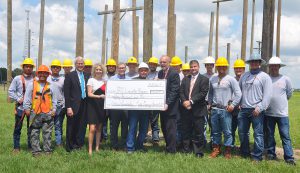 AVON PARK, Fla. — Sept. 6, 2019 — South Florida State College (SFSC) received a $15,000 grant from Duke Energy Foundation to create powerful communities in its service district of Hardee, DeSoto, and Highlands counties. The College is one of 18 organizations across Florida to receive grants supporting innovative workforce education and training programs through Duke Energy Foundation’s Powerful Communities program.
AVON PARK, Fla. — Sept. 6, 2019 — South Florida State College (SFSC) received a $15,000 grant from Duke Energy Foundation to create powerful communities in its service district of Hardee, DeSoto, and Highlands counties. The College is one of 18 organizations across Florida to receive grants supporting innovative workforce education and training programs through Duke Energy Foundation’s Powerful Communities program.
This grant will infuse SFSC’s Electrical Lineworker program with enhanced and updated equipment, increased training capabilities, enhanced readiness for job opportunities, and preparation for natural disasters, such as hurricanes. Equipment that will be purchased with the grant money are climbing kits that assist students in climbing utility poles; chromated copper arsenate-coated utility poles that students will use to practice rigging, setting, and climbing; aluminum conductor steel-reinforced wire to rig power transmission lines; and cross arms for the tops of power lines that students will use to become proficient in rigging and setting cross arms on power poles.
“The College is excited about its continuing partnership with Duke Energy and the opportunity to upgrade and improve the training capabilities of our Electrical Lineworker program through this grant,” said Erik Christensen, SFSC dean of applied sciences and technologies. “The grant will allow us to enhance that program with updated training equipment and tools which will enable us to provide expanded training opportunities for our students. As a result, our graduates will be better trained and prepared to enter the workforce and the disaster recovery capabilities of our service district will strengthen.”
SFSC’s Electrical Lineworker program prepares students to work as electric line technicians in the construction, maintenance, and repair of electric utility overhaul and underground systems. Through 1,500 contact hours of training at the College’s Hardee or DeSoto Campus, students gain an understanding of electrical systems, operations, and safety while mastering competencies in electrical distribution, basic electrical theory, and underground electrical construction operations. They learn how to maintain electric power systems and use electrical distribution equipment. The program provides practice in climbing, framing, building single and three-phase overhead lines, pole top and bucket rescue techniques, operating bucket trucks, and maintaining and repairing underground systems. Students who successfully complete the program earn a Career Certificate.
“We are proud to support South Florida State College’s Electrical Lineworker Certificate program,” said Catherine Stempien, Duke Energy Florida president. “The grant helps fund equipment that enables students to practice skills and gain real-world experience, directly aligning with industry changes and Duke Energy’s smarter energy future and grid modernization initiatives. Our workforce development grants help build stronger communities across the state by empowering a well-prepared workforce to meet needs in high-demand fields.”
“We value our partnership with Duke Energy and all that they continue to do in support of our college and this community,” said Jamie Bateman, SFSC executive director of institutional advancement and the SFSC Foundation. “Duke Energy’s team has gone the extra mile to work with our students and explain all of the requirements necessary for our students to get placed into a lineworker career. Our partnership goes beyond this grant as they work with our program directors in giving our students a competitive advantage when applying for positions after graduation. It’s this type of partnership and this type of friendship that exemplifies the meaning of community. We are grateful for their dedication and partnership.”
The Duke Energy Foundation’s Powerful Communities program makes strategic investments to build powerful communities where our natural resources thrive, students can excel, and a talented workforce drives economic prosperity for all. Every year, the Foundation gives more than $30 million to communities throughout Duke Energy’s seven-state service area.
For more information about SFSC’s Electrical Lineworker program, contact Christopher Yeomans, electrical distribution professor, by emailing YeomansC@southflorida.edu or calling 863-784-7045.
DUKE ENERGY FOUNDATION
The Duke Energy Foundation provides philanthropic support to meet the needs of communities where Duke Energy’s customers live and work. The Foundation contributes more than $30 million annual in charitable gifts and is funded by Duke Energy shareholder dollars. More information about the Foundation and its Powerful Communities program can be found at duke-energy.com/foundation.
Duke Energy (NYSE: DUK), a Fortune 125 company headquartered in Charlotte, N.C., is one of the largest energy holding companies in the United States. It employs 30,000 people and has an electric generating capacity of 51,000 megawatts through it regulated utilities and 3,000 megawatts through its nonregulated Duke Energy Renewables unit.

